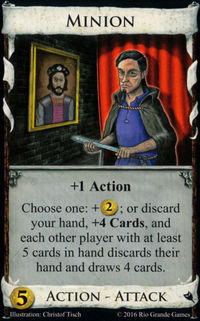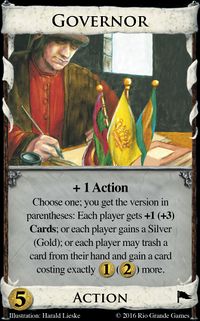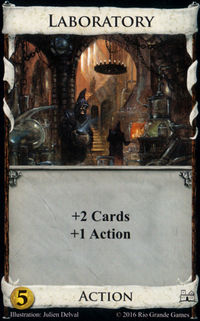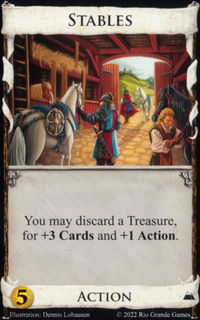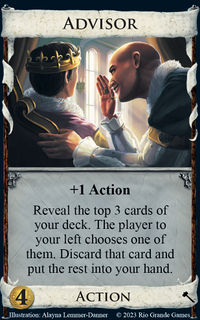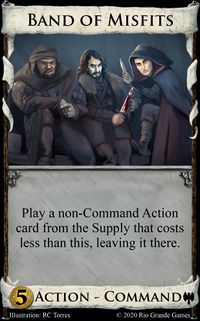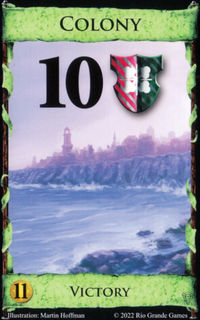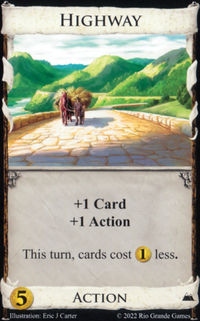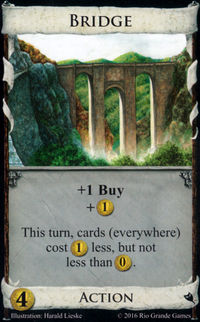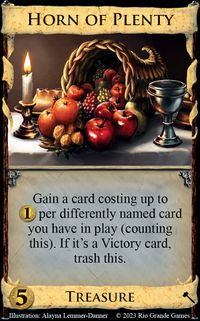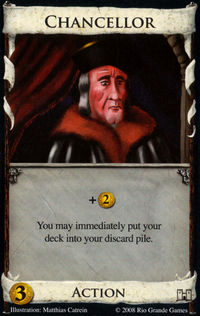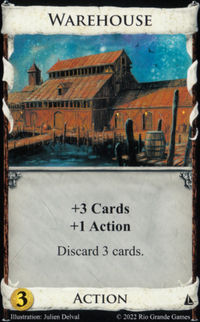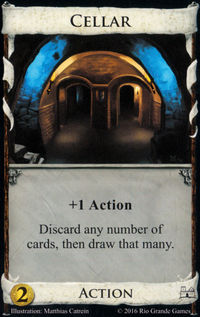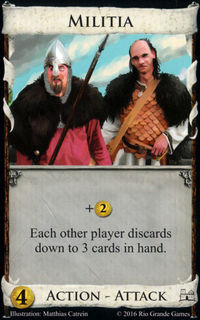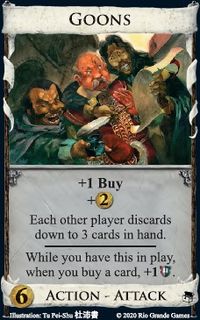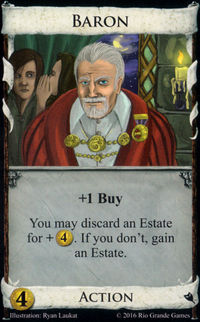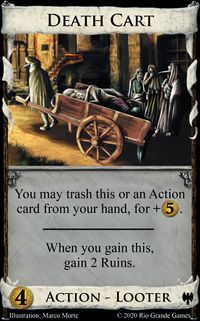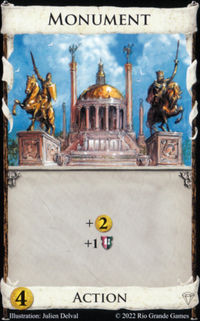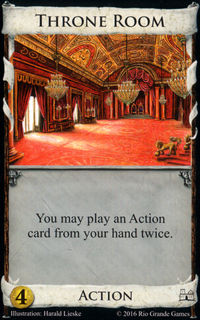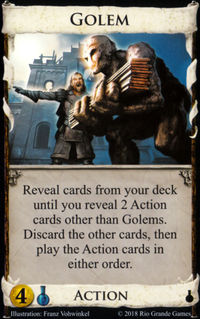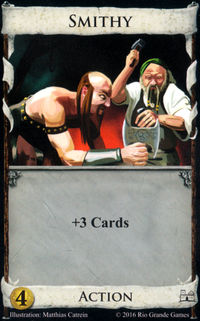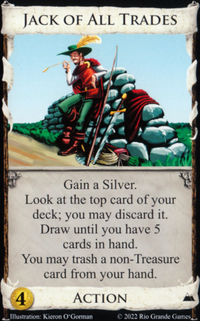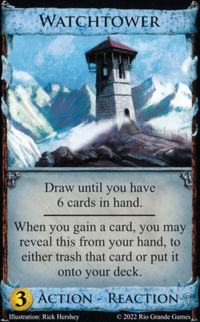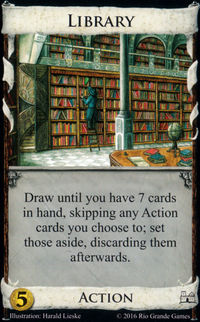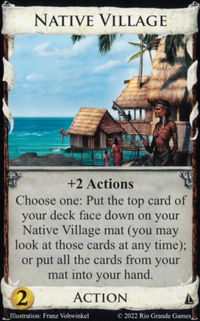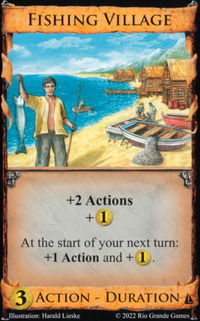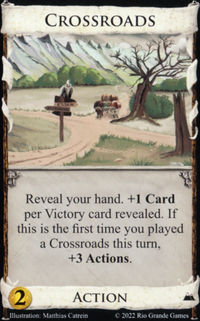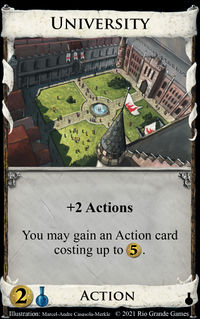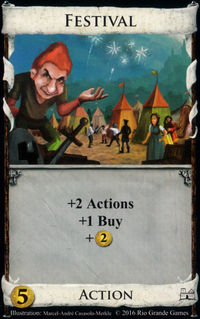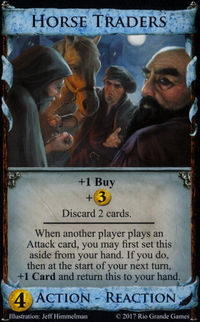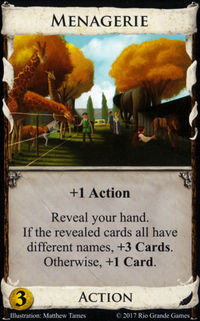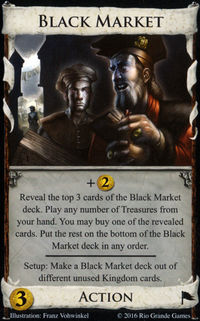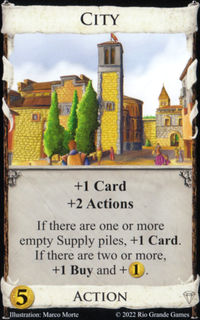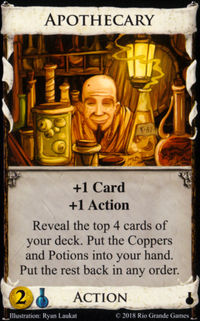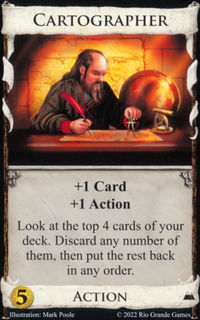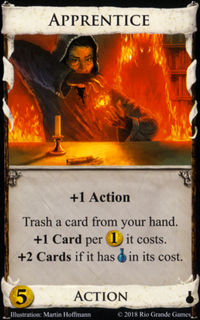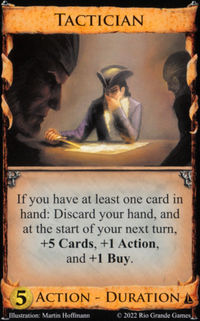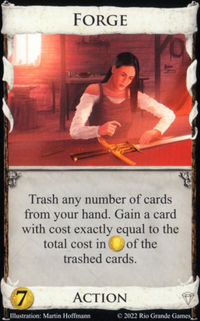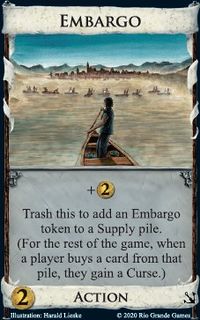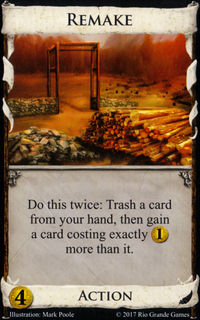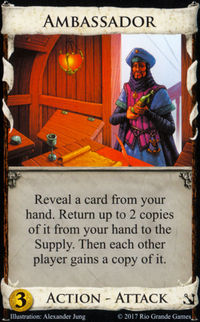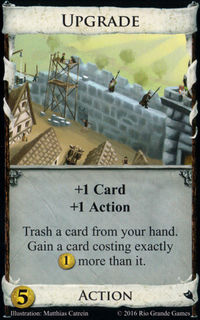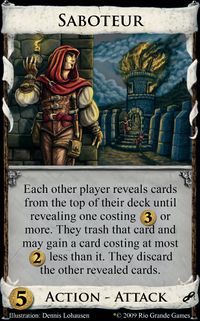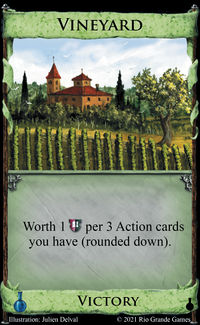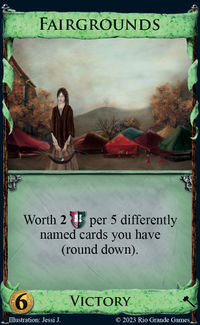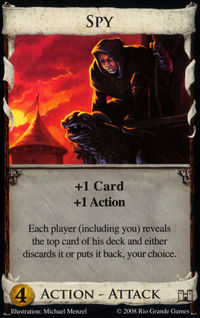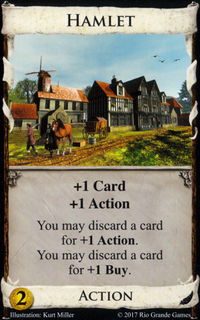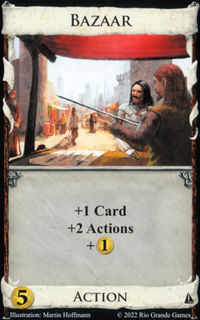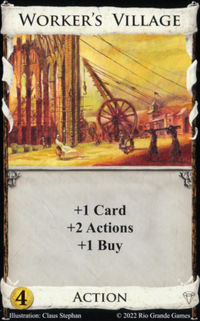Engine
Engine is an archetypical deck structure which aims to buy many Action cards and chain them together each turn. It is often contrasted with a Big Money strategy which seeks to buy mostly Treasures and only a few supporting Actions. To build an engine you generally need a village, terminal draw, and some sort of payload, which can include cards that help you get more cards (either a gainer or card offering +Buy), as well as trashers and Attack cards. You can also build an engine from only buying non-terminal actions: these include Hunting Party and Minion.
[edit] Types of Engines
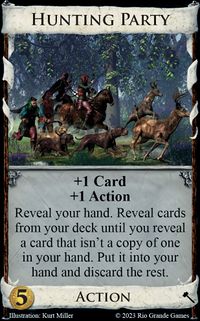
[edit] Single-Card Engines
These simple engines are typically powered by a single card. To achieve the required payload, they will often incorporate one or two other Action cards, especially cards which trash, sift, or produce .
- Hunting Party
- Minion
- Governor
- Laboratory, Stables, Advisor
- Band of Misfits can create a single card engine if all engine components cost or less.
[edit] Megaturn Engines
Megaturn engines are usually more complex and take longer to develop than other engines. These engines will often aim to gain multiple Provinces (or Colonies) in a single turn.
[edit] Draw Engines
Draw engines are simple engines which will typically employ +Action and +Cards kingdom cards to attempt to draw a large portion of your deck each turn. An article discussing the basics of this type of strategy can be found here.
[edit] Engine Strategy
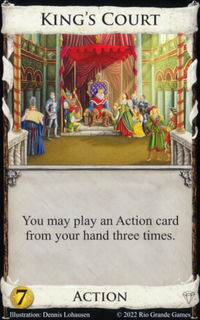
Original article by WanderingWinder. See here for an article about a comparison between engine payloads.
[edit] What characterizes the Engine?
An engine plays important Action(s) repeatedly, very often, and in large quantity every turn. Practically speaking, this means that you have massive deck-cycling in the form of card draw (not deck-cycling like, for example, Chancellor).
They are also typically fairly general and to some extent modular – you are looking more for types of cards than specific cards. You can replace most of the cards in the engine with similar substitutes and it would still work (e.g., swap Warehouse for Cellar), but if almost all of the cards must be a particular card and nothing else, then you’re probably looking at a “combo” more than an engine. Again, though, there’s not a bright dividing line.
[edit] What Different Kinds of Engines are there?
Engines encompass a wide variety of decks. They are generally characterized by some way to get lots of cards, then a “payload” of whatever important Actions you plan to play a lot. You can’t just buy nothing but villages and smithies, since if all you want to draw is Treasure then you may as well have played Big Money instead. Payload can be an Attack (Militia, Goons), some massive source of money and buys (Baron, Death Cart), or just things you want to play a lot (Horn of Plenty, Monument).
As for the deck-cycling, exactly how the deck works is going to vary from Kingdom to Kingdom, but there are some general categorizations which can be made.
[edit] The Village - Smithy Engine
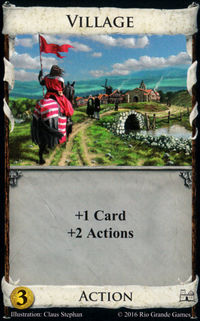
This is the most basic kind of engine you can build. The idea is that you play some card which gives multiple actions (Throne Rooms, King's Courts, and Golems can also count here) to be able to play big terminal draw cards in order to draw large portions of your deck. Once this comes together a bit, you can generally string several, Village-Smithy-Village-Smithy-Village-Smithy plays together. You can do almost anything as a payload for this kind of engine – what you want, exactly, will depend on the Kingdom.
[edit] The Draw-to-X Engine
This is similar to a Village/Smithy type of engine, but instead of regular draw, it uses one of the draw-to-X cards - occasionally Jack of all Trades, but more often Watchtower or Library, and most notably Minion. Given the differences in how the draw works, this deck needs to behave a little bit differently than the Village/Smithy version talked about above - you would ideally want to play some of your payload actions BEFORE your draw cards, but if your payloads and particularly draw cards are both terminals, you will need extra Villages in order to make this happen.
Disappearing villages (Native Village and Fishing Village, sometimes Crossroads, University, and Festival) tend to be better here relative to the Smithy versions, as the missed card draw isn’t AS problematic here. Further, cards that give benefits for discarding (like Horse Traders or Warehouse) shine a little extra in these decks, as you can draw past their downsides. Menagerie can sometimes work like the draw in these decks, bridging the gap between these and the next engine type.
It’s worth noting that these kinds of decks don’t work nearly so well as the Village/Smithy variety when your payload has to be Treasure. This is because you can’t really get rid of Treasure until after your Action phase (unless you have Black Market!).
[edit] Non-terminal Draw Engine
This engine depends on non-terminal drawing cards to go – things like Menagerie, Laboratory, Stables, a level 2-3 City, Apothecary, and others. Non-terminal draw, to be balanced, tends to draw you fewer cards than terminal draw, but there are a couple advantages to this kind of deck compared with the previous engines: it can work even without villages, and if you do have some villages, you can have more payload cards without getting too much terminal collision.
Sifters are also fairly decent here, if they are non-terminal, and even something like a large stack of Cartographers can make this kind of engine work, possibly without ever getting a handsize over 5 cards.
Hunting Party famously often works differently than the rest of these, with Hunting Party and terminal silver decks. Apprentice can work here, but you either need some mega-turn mechanism to go off, or the ability to gain very expensive cards for fuel, or the engine isn’t going to be running all that long.
[edit] Speciality Draw
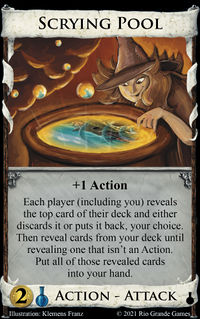
There are basically two cards that work very well here: Crossroads and Scrying Pool. They have among the highest drawing potential in the game (being unbounded in the amount they can draw), and if you are going for this as the basis of your deck (certainly you can at least use Crossroads without it being the focus), you need to prioritize the requisite cards more highly than normal. For instance, in a Crossroads-based engine, if you play something like Warehouse, you want to discard Coppers, usually Silvers, and even Golds, in order to be able to draw more off of the Crossroads.
[edit] Double Tactician
This is much more specialized than other kinds of engines and, along with the next kind of deck, lies between engine and combo. These work somewhat similarly to the draw-to-X engines actually – you need virtual money (or Black Market!), and then you need to play the second Tactician at the end of the turn. Cards that need large handsizes to reach their full benefit can really shine here, as this can get set up to draw more cards faster than most other engines, though the upside is potentially smaller; in any case, this includes things like Forge and Cellar.
[edit] The Mega-Turn Engine
Again, this plays (at least in terms of endings) almost closer to a combo deck than an engine. This is also more of a payload type than it is the actual driving force of the engine. Mega-turn engines seek to gain all of their points in one massive turn at the end of the game (or occasionally two or three). In these decks, you usually don’t want to green at all until the very very end, unless you have to green sooner to stop your opponent from being able to end in the lead. Embargo is particularly potent in these kinds of decks, as you can shrug off the clogging effects of the Curses – they’ll never cycle through your deck.
[edit] What’s Good For Engines?
In any engine you are going to need components to make it go, but that will vary from engine to engine. There are some general points though.
- Trashing, particularly strong trashing, is very good. Thinner decks turn into an engine faster than fatter decks. So Chapel, Remake, and Ambassador shine most in these, and cards like Upgrade are slightly worse but generally strongest in these kinds of decks as well.
- Attacks to slow your opponents down or sometimes to hurt their point totals give you extra time to get set up and dominate the game. Discard attacks and Saboteur find their best homes in these kinds of decks. Cursing attacks CAN be very good for these decks, too, IF you have the trashing (usually needs to be strong trashing) and draw in order to be able to clean them up – a non-engine opponent won’t be able to do the same. Otherwise your engine pieces will never connect.
- Alternate VP cards lengthen the game to give you time to get your engine up and running, provided that the engine is able to go for either the alt VP cards or Provinces; certain alt VP cards can help our your opponent more than you in some cases, particularly if it’s a slog you’re up against. But most especially Colonies, Vineyards, Fairgrounds, and VP chips are big, big-time engine cards.
- Gainers. Most engines need some way of gaining more than one card in a turn in order to come out well. This helps to be able to get a critical mass of components, as well as extra payloads and very often multiple Victory cards at once as well. For this, straight +Buy is usually important as well.
- +Actions like Village. Not always necessary, but they are commonly the only way to get all those cards into your hand (by giving you the Actions to play your +Cards cards) and/or the only way to play all those Actions you’ve drawn into your hand.
- Generally, you want payload. Engines are built to play certain Actions over and over again every turn. If there aren’t suitably strong Actions in the Kingdom, there’s no point in building an engine to play 10 Spies every turn.
[edit] How do I play an Engine?
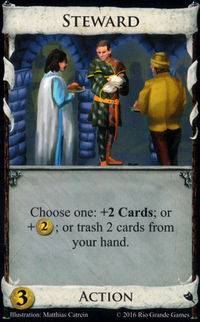
The biggest thing about playing the engine is to get the engine up and running first, before worrying about other things. This means not focusing on Treasure — you will need a little amount of money to get this going but not all that much. And then just focus very very hard on getting the cycling up to speed before worrying too much about other things. You often will want to pick up one attack early on to slow your opponent down, and at some point you may start to get hampered in your ability to buy more components because you can’t generate enough buying power – this should be your cue to get more payload; usually, you want to prioritize a nice (or even a or a ) engine piece over Gold, unless you really need extra money.
Eventually, you will have to turn for points, but you want to make sure that you are very well prepared to do so first. Generally it’s a bad idea to pick up any Provinces before you go virtually straight for green, green, and only green; if you green too early, your engine can gum up, and you will almost never have time to repair it afterwards. As for villages vs terminals, you generally want to get a terminal before you get a village to support it, while you are building up, though at some point you will switch over to over-villaging in order to make sure your initial hand can get off the ground. This gets skewed a little more when the village is giving you something else useful, a la Hamlet in a draw-to-X, Festival or Bazaar, or Worker's Village where you are desperate for more +buy.
Endgames usually depend a bit on the specific matchups, so...
[edit] Matchups
Against Big Money
A good money deck will usually be faster than you. Wait for quite a while before you go green, and when you do, be able to close the game out. Decently often, you will need to be able to get smaller ![]() in order to mount a comeback; keep this in mind, but also keep in mind that if you’re building a decent engine, you WILL be able to do this. Don’t get scared because you’re behind and start reaching for Provinces to close the gap – this is only sealing yourself in.
in order to mount a comeback; keep this in mind, but also keep in mind that if you’re building a decent engine, you WILL be able to do this. Don’t get scared because you’re behind and start reaching for Provinces to close the gap – this is only sealing yourself in.
Against Slog
The nice thing here is that the game will already be longer based on their deck choice, which gives you longer to get going than against a Big Money deck, and you sometimes need that. Against a slog, you need to be aware of what they’re going for. You don’t want to deny their cheap Victory cards in most cases, at least early on, because you will gum up much worse than they will. Make sure you don’t green until you can consistently buy out the big ![]() cards, take the lead and win.
cards, take the lead and win.
Alternatively, if they are playing slower, and building up to get an insurmountable VP matrix that you won’t be able to overcome, then they will probably need to start greening later, in order to have enough economy to finish this out. In these cases, you can look to see if you can green early and actually go for some late blockage, after you have a decent amount of bigger ![]() . This can lock them out of their VP matrix, and in fact, there are some cases where you just win right there, since they won’t be in a position to go after the expensive
. This can lock them out of their VP matrix, and in fact, there are some cases where you just win right there, since they won’t be in a position to go after the expensive ![]() to come back, so it won’t matter that you’ve gummed yourself up.
to come back, so it won’t matter that you’ve gummed yourself up.
In any case, watch out for a three pile ending.
Against Rush
This is a difficult matchup for engines – you need to be able to get a lot of ![]() before they can end the game. The strongest engines can do this, of course, but they need to be very strong. Once you get the lead, and stabilize it against them grabbing Estates or hitting a new plateau on their scaling alt VP card, you’ve very often won, because they won’t have a lot of other ways to gain points. But surviving long enough to have this happen can be a problem. And three pile endings can KILL you here.
before they can end the game. The strongest engines can do this, of course, but they need to be very strong. Once you get the lead, and stabilize it against them grabbing Estates or hitting a new plateau on their scaling alt VP card, you’ve very often won, because they won’t have a lot of other ways to gain points. But surviving long enough to have this happen can be a problem. And three pile endings can KILL you here.
Against Combo
You would play this very similar to the Rush. Watch out for three pile endings. Here, you also want to look to try to make your own happen. Most of all, you want to either have the game ended, or be about to end it, by the time they establish their combo. Because if they get it up fast enough, you can well be dead.
Against Engine (mirror)
This plays differently than all the other matchups, and particularly different than the Big Money matchup. Usually, you need a lot of engine components, and they do too, so you end up going for many copies of the same thing… which does a couple things. First of all, winning splits becomes rather important in many cases – to figure out when, look for what makes your engine go, what it needs to survive. Generally, you will need multiples of at least draw cards and some form of extra actions (i.e. villages). If there’s only one draw card or only one village, winning that split can be massive. This is probably most true on the village front – villages let you play your terminals; if you win even 6-4, you can play 7 terminals on a turn, and they can only get 5 – this is massive. +buy or gaining cards CAN also work this way, though this is somewhat more rare, as usually you don’t need more than 4 buys in a turn that badly.
The other thing is that this makes three pile endings much more common. WATCH OUT FOR THEM. This in turn, makes having a lead more important, so that you can three pile end it on them, and so they can’t do the same to you. In fact, you can use something like a Duchy as a weapon against them – not only does it give you points, but it can actually stop them from picking up engine components, as you threaten to three pile end it if they do.
One of the things you have to watch out for when winning splits is that you don’t go too crazy. If you win a Village split 8-2, you need to make sure they can’t end it so fast that you won’t get to enjoy the advantage; you need to be able to do something with it at some point. So here, you want to green earlier than you would in any other matchup where you are playing an engine. Only, you need to take care that you aren’t greening too early, as they will be able to play the long game and grab LOTS of points to wipe you out. To figure out the timing right, keep watch of each of your decks to see how reliable they are, and more importantly, how much they can get in terms of money and buys.
If there are gains to be had, remember that they can happen mid-turn and then those gained cards can be used mid-turn in a lot of cases – watch out for it. Always keep your eye out on potential. If they won’t be able to three pile you, generally keep building, unless you reach the other stop criteria, which is that if you can just straight buy enough ![]() to end the game with a win, should you start buying green right now, then go ahead and green. That is, if you can buy 5 Provinces easily starting now, without gumming too much, and this won’t gum you too much to be able to maintain the lead, then go for it.
to end the game with a win, should you start buying green right now, then go ahead and green. That is, if you can buy 5 Provinces easily starting now, without gumming too much, and this won’t gum you too much to be able to maintain the lead, then go for it.
[edit] Terminology
The term 'Engine' in the context of Dominion is a controversial one. As this page shows, the word Engine can describe a number of different deck types. Adam Horton is one of the notable adversaries of the 'E-word', since it severely lacks specificity and therefore is not really an instructive term to use. The idea is not to depricate the usage of certain words, but rather to add more value and transparency to the discussion of Dominion by using more specific terminology. See the Article by Adam Horton for the full discussion.
